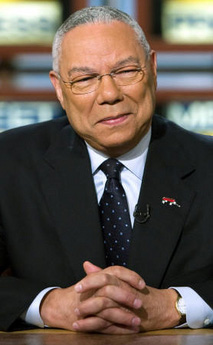 |
 |
 |
 Editorials | Issues | June 2007 Editorials | Issues | June 2007  
Colin Powell on Guantanamo: Close It
 Tracy Dove, Ph.D - Russia Today Tracy Dove, Ph.D - Russia Today


| | Former U.S. Secretary of State General Colin Powell is seen during a live taping of NBC's Meet the Press show June 10, 2007. Powell said on Sunday the U.S. military prison at Guantanamo Bay for foreign terrorism suspects should be immediately closed and its inmates moved to the United States. (Reuters/Brendan Smialowski) |
While the Bush administration can count its number of defections on the low side, a few of the deserters have surfaced with criticism of the current government that ranges from constructive to destructive. This weekend, former Secretary of State Colin Powell came forward with his own recommendations for the Bush administration and the advice is echoed in most halls of the opposition's collective mind: do something with the prisoners at the Marine naval base on Guantanamo Bay, Cuba.

Many articles and commentaries have been penned in criticism and support of the prison at Guantanamo, but what of the marine base itself? This, too, is a critical issue, because of its controversial history in American foreign policy. The source of contention is the flimsy document upon which the United States bases its claim to continue to operate the post in Cuba, and naturally Fidel Castro has his issues about the lease and never tires of recounting them to any inquisitive journalist willing to lend an ear.

We must return to America's first imperial war- as it is popularly called- the Spanish-American war of 1898, in order to understand how the United States came to occupy land in a hostile country. Theodore Roosevelt had a special interest in Cuba; it was his belief that the Spanish had no claims to a continued cruel and oppressive colonial regime in this hemisphere, and when the war began, marines were landed on the beaches of Guantanamo Bay and 2 were killed in the fighting. This gave the real estate there a certain amount of legitimacy with the American military, but it was five years later when Roosevelt signed a lease agreement with the new Cuban government that the Americans' rights to unlimited usage of the territory were guaranteed. The lease was further backed up by the Platt Amendment, which gave the United States the right to intervene in Cuban affairs as seemed fit.

Roosevelt's price of $2,000 in gold coins per year may conjure up images of purchasing Manhattan Island from the Indians for $24 in costume jewelry, but a contract is a contract and the United States made thorough usage of the Platt Amendment's article VIII, making the occupation of Guantanamo Bay part of a permanent treaty which can only be cancelled by both governments' agreement.

The next Roosevelt- Franklin Delanoe- saw to the annulment of the Platt Amendment but renegotiated the treaty in a similar fashion. One of the signatories of the new lease was the notorious Fulgencio Batista- the new ruler of Cuba after a revolution brought him to power in 1934. The resulting relationship was one of profits for Batista and American capital, with the Cuban population paying the price in human rights violations, brutality and execution. Batista was a friend of organized crime and made Havana into the "Las Vegas" of the Caribbean, allowing for gangsters to conduct their business in relative freedom. For the next 25 years, he ruled with an iron fist while the United States looked on with tacit approval, preferring a brutal dictator to the social upheaval that surely would replace Batista.

After the Cuban Revolution of 1959, the United States held on to the base on Guantanamo Bay not for its regional strategic value, but as a source of espionage and pressure on the Castro regime. Since then, a Caribbean "Cold War" ruled on this tiny strip of land; during the Cuban Missile Crisis, family members were evacuated so fast that they were told to tie up pets in the yard and leave the keys to the house on the dining room table. It was only in 1964 that they returned to the base, which since then had to find new sources for water, energy and electricity, since Castro cut off all deliveries to the base.

What about those $2,000 in gold coins? It seems that Castro made the mistake of cashing the first check sent by the US government for 1960, which gave legitimacy to the American claim that the lease remained valid. Since then, Castro has ceremoniously ripped up every check sent by the State Department, although the protest is dwarfed by other major issues in American-Cuban relations.

Colin Powell was careful to say that the prison in Guantanamo Bay should be closed, and not the base itself. He stated that the prisoners should be brought to American soil and tried in a court of law. Judging by the sour history that precedes Guantanamo, it is unlikely that this administration will make any decisions that would appear to bolster Castro's popularity in the region.

Tracy Dove, editor of Russia Today, is a Professor of History and the Department Chair of International Relations at the University of New York in Prague. | 
 | |
 |



